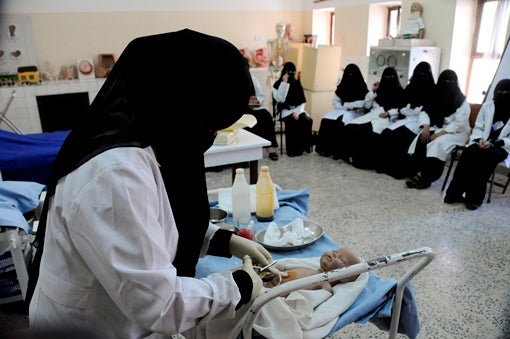 According to Yemen’s National Population Council, maternal deaths in Yemen are the highest in the Middle East. Barely a third of births take place with the help of experienced health workers, and barely a quarter in hospitals or clinics, meaning that most Yemeni women give birth at home with only the help of unskilled health workers, exposing them and their newborns to greater risk.
According to Yemen’s National Population Council, maternal deaths in Yemen are the highest in the Middle East. Barely a third of births take place with the help of experienced health workers, and barely a quarter in hospitals or clinics, meaning that most Yemeni women give birth at home with only the help of unskilled health workers, exposing them and their newborns to greater risk.
The profile of a typical victim of maternal mortality would be of a young Yemeni woman who left school because her parents couldn’t afford to let her finish her education, and whose parents encouraged her to marry a man her father’s age because they thought it would be better for her.
Instead, she finds herself trapped in a domestic prison even worse than the one she was brought up in, caring for her husband’s large, extended family and tending to their fields. After giving birth to three children, she finds herself pregnant for the fourth time in six years. Her pregnancy does not, however, excuse her from her daily duties; her husband and his family don’t know enough about maternal health to allow her to rest up.
Seven months into her pregnancy, she develops labor pains but her husband feels he doesn’t have enough money to take her to the hospital. The local midwife he calls in to check on her assures him there’s nothing wrong. When his wife worsens and grows pale, however, he takes her to the nearest health clinic. Their journey takes two hours on unpaved rural roads and when they reach the clinic, she’s referred to the district hospital. There she is moved to the operating theater, where she and her unborn child die.
The woman doctor attending her says the young woman has died of complications related to pregnancy, compounded by severe malnutrition and fatigue. She has died in the prime of her youth, leaving three children. She and her unborn child become statistics: Six women die every day in Yemen from complications while giving birth or during pregnancy. Is it not time for us to help women avoid life threatening dangers so that marriage and child-bearing are a right and a choice for them rather than oppression, even murder?
According to World Bank statistics, Yemen's maternal mortality rate has dropped in the past 20 years by two-thirds, but is still high, with about 200 deaths per 100,000 births. See http://datatopics.worldbank.org/gender/country/yemen,-rep.


Join the Conversation